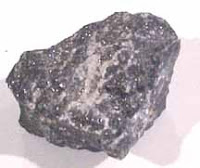Talc
Over 40 million tonnes deposits of talc have been identified in Niger, Osun, Kogi, Ogun and Kaduna states. The Raw Materials Research and Development Council (RMRDC)’s 3,000 tonnes per annum catalytic plant is the only talc plant in the country. The talc industry represents one of the most versatile sectors of the industrial minerals of the world. The exploitation of the vast deposits would therefore satisfy local demand and that for export.
Gypsum
Gypsum is an important input for the production of cement. It is also used for the production of Plaster of Paris (P.O.P) and classroom chalks. A strategy for large-scale mining of gypsum used in the cement industries is urgently required to sustain the existing plants and meet the future expansion. Currently, cement production is put at 8 million tonnes per annum while the national requirement is 9.6 million tonnes. About one billion tonnes of gypsum deposits are spread over many states in Nigeria.
Iron Ore
There are over 3 billion metric tonnes of iron ore in deposits found in Kogi, Enugu and Niger States as well as the Federal Capital Territory. Iron Ore is being mined at Itakpe in Kogi State and is already being beneficiated, up to 67 per cent of iron. The Aladja and Ajaokuta Steel complexes are ready for consumers of billets and other iron products for down-stream industries.
Lead/Zinc
An estimated 10 million tonnes of lead/zinc veins are spread over eight states of Nigeria. Proven reserves in three prospects in the east-central area are 5 million tonnes. Joint venture partners are encouraged to develop and exploit the various lead/zinc deposits all over the country.

Bentonite and Baryte
These are the main constituents of the mud used in the drilling of all types of oil wells. The Nigerian baryte has specific gravity of about 4.3. Over 7.5 million tonnes of baryte have been identified in Taraba and Bauchi States. Large bentonite reserves of 700 million tonnes are available in many states of the federation ready for massive development and exploitation.
Gold
There are proven reserves of both alluvial and primary gold in the schist belt of Nigeria located in the south-western part of the country. The deposits are mainly alluvial and are currently being exploited on a small scale. Private investors are invited to stake concessions on these primary deposits.







Good day Sir,
ReplyDeleteI have read your write ups and they look very interesting. But like every business that exists on the face of the earth, there are risks associated. Please, i will like to find out the risk associated with trading in Lead Ore. I have made a few contacts with some partners in China, and they seem to have unlimited demand, but i want to really know the risks associated with the business of exporting. And what is the quality specifications of lead ore that can be obtained in Nigeria.
Thank you
The main risk is getting the quality right and you can get a lead quality as high as 70-80% purity from Nigeria.
ReplyDelete